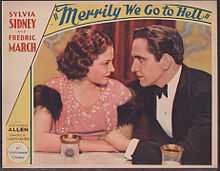Merrily We Go to Hell
| Merrily We Go to Hell | |
|---|---|
 | |
| Directed by | Dorothy Arzner |
| Starring |
Fredric March Sylvia Sidney Richard "Skeets" Gallagher Cary Grant |
| Distributed by | Paramount Pictures |
Release dates |
|
Running time | 88 minutes |
| Country | United States |
Merrily We Go to Hell is a 1932 Pre-Code film starring Academy Award winning actor Fredric March and Sylvia Sidney. The film was directed by Dorothy Arzner. The film's title is an example of the sensationalistic titles that were common in the Pre-Code era.[1] Many newspapers refused to publicize the film because of its racy title.[2] March plays a man undone by alcoholism.[3] The title is a line his character says while making a toast.[4]
March plays an adulterous husband. Sylvia Sidney plays his wife who, when she discovers his adultery, cheats on him with another man (played by Cary Grant in one of his earliest roles).[4] The film received a mixed review from The New York Times upon its release.[5]
Plot
Jerry Corbett (Fredric March), a Chicago reporter and self-styled playwright, meets heiress Joan Prentice (Sylvia Sydney) at a party and they begin dating. Even though Jerry's economic prospects are dim and he is an alcoholic, he proposes to Joan. She agrees to marry him, against her father's objections. Even when Jerry becomes completely inebriated just before (and ruins, as far as Joan is concerned) their engagement party, Joan stands by him. Jerry writes some plays which are rejected, and fights the urge to drink. He manages to sell a play and they go to New York to see it produced. The star of the production is Jerry's former girlfriend Claire, and on the premiere night he gets stinking drunk, and mistakes Joan for Claire. Still, Joan stands by him. But, when Joan catches Jerry trying to go to Claire's one night she kicks him out. The following day she tells him that they will have a "modern marriage" and that she intends to have affairs herself.
When Jerry is next seen he is making a "Merrily we go to hell" toast with Claire. In turn Joan and her date toast to the "holy state of matrimony–single lives, twin beds and triple bromides in the morning." Joan becomes pregnant, and finds out she is in poor health. She tries to tell Jerry, but he is busy with Claire, so she moves on. Jerry then realizes that he loved her all along. He sobers up, returns to Chicago, and works as a reporter again, but Joan's father keeps them apart. Jerry discovers Joan has given birth from a gossip columnist and goes to the hospital to see her. Joan's father tries to keep him out and tells him the baby is dead and that Joan is very ill. Jerry gets into her room, and discovers his distraught wife, pleading to see him. A repentant Jerry pledges his love to her in a heartfelt plea, and they kiss.
Cast
- Sylvia Sidney: Joan Prentice
- Fredric March: Jerry Corbett
- Adrianne Allen: Claire Hempstead
- Richard "Skeets" Gallagher: Buck
- George Irving: Mr. Prentice
- Esther Howard: Vi
- Cary Grant: Charlie Baxter
- Kent Taylor: Greg Boleslavsky
Reception
Mordaunt Hall, film critic for The New York Times, gave the film a mixed review upon its release.[5] Hall believed the film was wildly funny in stretches, and described the acting by the two leads as "excellent", but believed the scenes in which March played intoxicated went nowhere, and that the script was lacking.[5] However, despite similar reviews, which often noted that it had been directed by a woman, the film was one of the more financially successful films that year.[6]
Notes
- ↑ Doherty. pg. 103
- ↑ Doherty. p. 108
- ↑ Merrily We Go To Hell, Times Daily, July 8, 1932, accessed October 11, 2010.
- ↑ 4.0 4.1 Merrily We Go to Hell, tcm.com, accessed October 12, 2010.
- ↑ 5.0 5.1 5.2 Hall, Mordaunt. Merrily We Go to Hell (1932) - "I, Jerry, Take Thee, Joan.", The New York Times, June 11, 1932, accessed October 12, 2010.
- ↑ Mayne, p. 59
References
- Doherty, Thomas Patrick (1999). Pre-Code Hollywood: Sex, Immorality, and Insurrection in American Cinema 1930-1934. New York: Columbia University Press. ISBN 0-231-11094-4.
- Mayne, Judith (1994). Directed by Dorothy Arzner. Indiana University Press. ISBN 0-253-20896-3.
External links
| ||||||